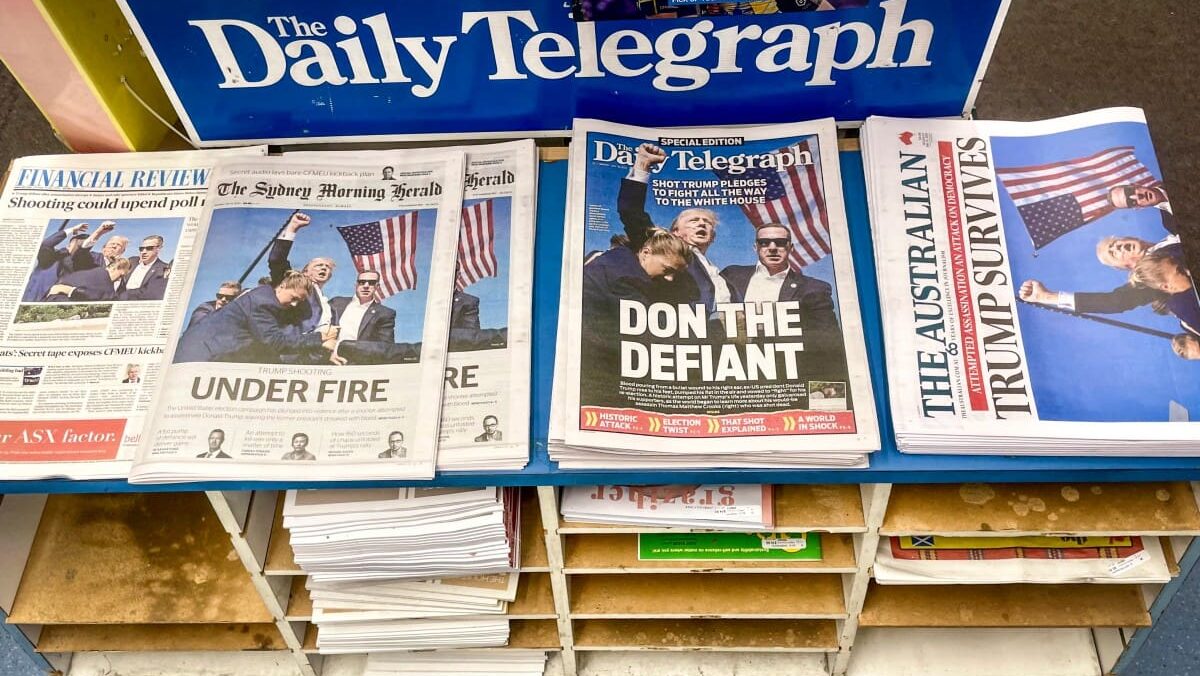
The morning newspapers on display at a shop in Sydney on July 15, 2024, show the headlines and photos after the assassination attempt on former U.S. president and Republican presidential candidate Donald Trump in Butler, Pennsylvania on July 13, 2024.
Photo: DAVID GRAY / AFP
Elements of the international media did an impeccable job of covering the attempted assassination of former U.S. president Donald Trump—an attack which also saw one person killed and two seriously injured.
To his credit, the BBC’s senior North America correspondent Gary O’Donoghue conducted an insightful on-the-ground interview with a witness shortly after the gunshots rang out.
FULL INTERVIEW with a witness, talking to @BBCNews, who says he saw a man with a gun on a building roof firing shots.
— BBC Newsnight (@BBCNewsnight) July 14, 2024
Donald Trump was rushed off stage during a rally in Pennsylvania after gun shots were heard.
He talked to @BBCBlindGazza – more information @BBCNews pic.twitter.com/aWqSXbzor2
Many have also praised the first-class photographers who potentially risked their lives to secure instantly iconic images that will be printed in the history books.
Republican presidential candidate former President Donald Trump raises his fist as he is rushed off stage after an assassination attempt during a campaign rally in Butler, Pa. @apnews pic.twitter.com/VoAYqRC4QV
— Evan Vucci (@evanvucci) July 14, 2024
Some extraordinary photography from the assassination attempt
— Kenny Farquharson (@KennyFarq) July 14, 2024
but none better than this from Anna Moneymaker of Getty. The light. The framing. The blood. The open hand. Almost biblical. pic.twitter.com/inFmQ8F1ZR
Other elements acted shamefully, as readers would expect them too—either downplaying the seriousness of the event or putting a portion of the blame on Trump himself.
Even after footage had emerged which made it quite clear—even if on a very basic level—what had happened, various mainstream media publications pumped out such euphemistic headlines as these:
These and other headlines prompted recent Trump-backer Elon Musk to criticise the “legacy media” as “a pure propaganda machine.”
The legacy media is a pure propaganda machine. 𝕏 is the voice of the people. https://t.co/oTKsmrIMms
— Elon Musk (@elonmusk) July 14, 2024
Indeed, the day after the attempted murder of the former president, The Sunday Denver Post decided to run with this:
Stop reading them. Stop listening to them. pic.twitter.com/ajN5w06LWI
— Peter Whittle (@prwhittle) July 14, 2024
This made the job of satirical site The Babylon Bee fairly easy, which joked that CNN might have reported the assassination of Abraham Lincoln as follows:
How CNN Reported 7 Famous Assassinations Throughout History https://t.co/hL97tjh7jb pic.twitter.com/7cqgZqUPkQ
— The Babylon Bee (@TheBabylonBee) July 14, 2024
Too many publications then did their best to make out that Trump was, in fact, largely to blame for his own attempted assassination.
“Nothing justifies an assassination bid,” wrote Sky News U.S. correspondent James Matthews, “but did Trump play part in changing the rules of engagement?”
Macroeconomist, financial analyst, and “Multipolarity” podcast host Philip Pilkington said such headlines were reminiscent of those that followed the attempted murder of Slovakian Prime Minister Robert Fico earlier this year, and had harsh words for those “revolting people who poison our societies with their love of violence.”
And here come the same headlines we saw after the Fico attempt from the gutter rats and violence promoters in the ‘mainstream’ media. Revolting people who poison our societies with their love of violence. pic.twitter.com/ahjQiZgZ3c
— Philip Pilkington (@philippilk) July 14, 2024
Sky News clearly felt a backlash, given that it soon changed the headline to one which was far more mild: “U.S. politics is laced with malevolence and division—it needs a reset.”
But The Atlantic still carries this line in one of its commentaries on the shooting:
The gunman and Trump, at their opposite ends of a bullet’s trajectory, are nonetheless joined together as common enemies of law and democracy.
Britain’s LBC radio also invited the husband of the late MP Jo Cox, who was murdered in an act of violence in 2016, to its airwaves who told listeners: “Yes I feel sympathy … but Donald Trump also has some culpability in creating an environment where violence is more likely.”
'Yes I feel sympathy… but Donald Trump also has some culpability in creating an environment where violence is more likely.'
— LBC (@LBC) July 14, 2024
Husband of the late MP Jo Cox, who was a victim of political violence, @MrBrendanCox reacts to the Trump rally shooting. @BenKentish pic.twitter.com/OXkQZTvSWI
Once again, The Babylon Bee’s work had already been done for it.
Trump Indicted For Inciting Assassination Attempt https://t.co/sBlGGV8QvE pic.twitter.com/bRttmRnQhN
— The Babylon Bee (@TheBabylonBee) July 14, 2024
Much has also been made of Trump’s initial response to his shooting—to raise himself to the crowd, put his fist up and say “Fight! Fight! Fight!”
'Many Trump supporters stood up, apparently fearlessly, and cheered as the president was ushered off stage, as if more concerned with his wellbeing than their own.'
— The Spectator (@spectator) July 14, 2024
✍️ Teresa Mull
“Trump was defiant, and calling for revenge,” said Moira Donegan, The Guardian’s U.S. columnist. Writer Mark Hemingway described this as “incredibly irresponsible journalism … In no way, shape, or form has Trump called for revenge after being shot.”
Joe Concha added in an article for the New York Post that the former president’s display
was emblematic of Trump’s toughness and determination and defiance, even after taking a bullet to the ear just one minute earlier.
But on CNN, this was seen as a big no-no, even as the horrific scene was unfolding.
“That’s not the message that we want to being [sic] sending right now,” CNN’s Jamie Gangel chided the wounded candidate. “We want to tamp it down.”
Yes: The network that has endlessly attacked Trump as a racist, fascist demagogue seeking to destroy democracy was lecturing him just seconds after he was a millimeter away from being murdered.
“For these outlets,” Concha concluded, “there’s no coming back from this.”
